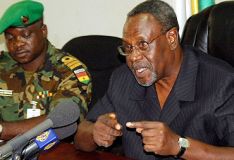As Sudan denies Darfur attacks, AU ups pressure
Oct 3, 2005 (KHARTOUM) — The Sudanese army on Monday rejected African Union accusations that it had coordinated attacks on civilians with Arab militia in Darfur in the past week.
 But the pan-African body stepped up its diplomatic pressure by sending a top official to Khartoum to express concern.
But the pan-African body stepped up its diplomatic pressure by sending a top official to Khartoum to express concern.
An African diplomat suggested a summit of the 53-nation AU scheduled to be hosted by Sudan in January could be changed to another venue as a form of protest from around the continent.
Despite spiralling violence in recent weeks, AU mediators and delegates agreed on Monday to press ahead with Darfur peace talks in the Nigerian capital Abuja.
Tens of thousands have been killed during the 2-1/2 year-old revolt in Sudan’s remote west and more than 2 million have fled their homes during a campaign of widespread rape, killing and burning of villages rebels blame on pro-government militias.
A Sudanese army spokesman said the AU reports of coordinated attacks were based on comments from aid agency officials in Darfur and were unreliable. He also denied reports any helicopter gunships had been used in attacks in recent days.
“We vigorously refute the comments from ambassador Baba Gana Kingibe,” the spokesman said, reading from an army statement.
There was no immediate reaction from the aid agencies that have more than 10,000 workers operating in Darfur.
Kingibe, head of the AU mission monitoring a shaky ceasefire, told reporters on Saturday government helicopters had been seen flying in areas attacked. He said it “gave credence” to accusations by rebel groups of collusion between Sudanese forces and the Arab militias known as Janjaweed.
“We say to the African Union, who are monitoring the region, that after Sept. 21 we have not used any helicopters at all,” the army spokesman countered. “This was the last date a helicopter was used and this was during the events of Shearia.”
REBEL ATTACK
Rebel forces attacked the government garrison town of Shearia in South Darfur last month, prompting retaliation by militias and the government in the past week.
At AU headquarters in Ethiopia, spokesman Adam Thiam said it was sending deputy chairman Patrick Mazimhaka to Khartoum.
“He is going to express the concern of the pan-African organisation in light of the recent development in Darfur and demand explanation over recent attacks on villages and refugee camps in Darfur in which 32 people were killed,” he said.
An African diplomat in Addis Ababa, who declined to be named, told Reuters the Khartoum summit was in the balance.
“It is possible that many African countries, angered by the bombing of civilians sheltered at refugee camps, may ask the AU to seek another venue,” he said.
In his weekend comments, Kingibe said both government and rebels were breaking a ceasefire in the vast area, the size of France, despite peace talks in Abuja.
The army spokesman said it was rebels who had targeted civilians in Darfur and the army was defending them.
Darfur rebels accuse the central government of neglect and of monopolising wealth and power.
Peace talks have been hindered by continued fighting on the ground and the International Criminal Court is investigating alleged war crimes in the region.
But AU chief mediator Salim Ahmed Salim told delegates at their first face-to-face meeting in Abuja since the talks resumed on Sept. 15 that detailed negotiations on power-sharing and other issued would proceed.
“The efforts will continue …,” he said.
The AU has almost 6,000 forces deployed in Darfur.
(Reuters)
